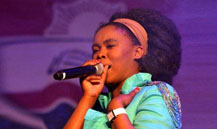 |
Photo: Thabo Kessah
2 September 2012 |
On Saturday 13 October 2012, the university will host the annual Kovsie Extravaganza. The music festival, named Zircus, will showcase the best of our student performers as well as the multiple South African Music Award-winning singing sensation, Zahara.
The musician will share the stage with local groups such as the UFS Choir, the Chamber Choir as well as Voices Inc. The Sêr groups of the residences Emily Hobhouse, Sonnedou, Tswelopele, Vishuis, Villa Bravado and Welwitchia have also been lined up for the show. Veritas and Marjolein, the winners of the Campus Sêr competition who came third and second respectively in the National Sêr competition are also part of the exciting line-up.
The show, the Arts and Culture office's final event of the year, promises to wow and thrill students, staff and members of the public with some breath-taking performances from the wide array of talent that Kovsies’ possesses.Tickets are available in Office 5 and 6, Thakaneng Bridge with students paying R50 while the public pay R80.
Venue: Callie Human Centre
Date: 13 October 2012
Time: 19:30
For more information call 051 401 9876/2819.